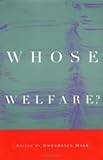Whose Welfare? / ed. by Gwendolyn Mink.
Material type: TextPublisher: Ithaca, NY : Cornell University Press, [2018]Copyright date: ©1999Description: 1 online resource (288 p.)Content type:
TextPublisher: Ithaca, NY : Cornell University Press, [2018]Copyright date: ©1999Description: 1 online resource (288 p.)Content type: - 9781501728891
- Poor women -- Government policy -- United States
- Public welfare -- United States
- Welfare recipients -- Employment -- United States
- Women with social disabilities -- Government policy -- United States
- Agriculture
- Gender Studies
- Sociology & Social Science
- POLITICAL SCIENCE / Public Policy / Social Services & Welfare
- 362.83/8/0973 21
- HV1445 .W46 1999
- online - DeGruyter
| Item type | Current library | Call number | URL | Status | Notes | Barcode | |
|---|---|---|---|---|---|---|---|
 eBook
eBook
|
Biblioteca "Angelicum" Pont. Univ. S.Tommaso d'Aquino Nuvola online | online - DeGruyter (Browse shelf(Opens below)) | Online access | Not for loan (Accesso limitato) | Accesso per gli utenti autorizzati / Access for authorized users | (dgr)9781501728891 |
Frontmatter -- CONTENTS -- Introduction -- I. Historical Perspectives on Contemporary Welfare Politics -- 1. Dependency and Choice: The Two Faces of Eve -- 2. When Work Is Slavery -- 3. From Maximum Feasible Participation to Disenfranchisement -- II. Class, Race, and Gender in the New Welfare Regime -- 4. Welfare and Work -- 5. Asian Immigrant Communities and the Racial Politics of Welfare Reform -- 6. Women, Welfare, and Domestic Violence -- 7. Welfare's Ban on Poor Motherhood -- III. Toward a New Welfare Politics? -- 8. Aren't Poor Single Mothers Women? Feminists, Welfare Reform, and Welfare Justice -- 9. Welfare, Dependency, and a Public Ethic of Care -- 10. Toward a Framework for Understanding Activism among Poor and Working-Class Women in Twentieth-Century America -- Contributors -- Index
restricted access online access with authorization star
http://purl.org/coar/access_right/c_16ec
Over the past few decades, the goal of welfare reform has been to move poor families off of welfare, not necessarily out of poverty. By that criterion, the Personal Responsibility and Work Opportunity Act of 1996 has been successful indeed: throughout the nation, millions have vanished from the welfare rolls. But what has been the cost of this "success" to the women and children who were the overwhelming majority of recipients? Here a group of distinguished feminist scholars examines the causes and the impact of recent changes in welfare policy. Some of the authors trace the politics of welfare from the 1960s, emphasizing how attitudes toward "motherwork" and "working mothers" have evolved in the backlash against poor women's motherhood. Several other authors consider the effects of the new welfare policy on employment and wages, on the lives of noncitizen immigrants, on poor women's ability to escape domestic violence, and on their reproductive and parental rights. A third set of authors explores dependency and caregiving, along with the role of feminist thinking on these issues in the politics of welfare.Whose Welfare? concludes with a historical analysis of activism among poor women. By illuminating that legacy, the volume challenges readers to build progressive agendas from the demands and actions of poor and working-class women.
Mode of access: Internet via World Wide Web.
In English.
Description based on online resource; title from PDF title page (publisher's Web site, viewed 26. Apr 2024)


